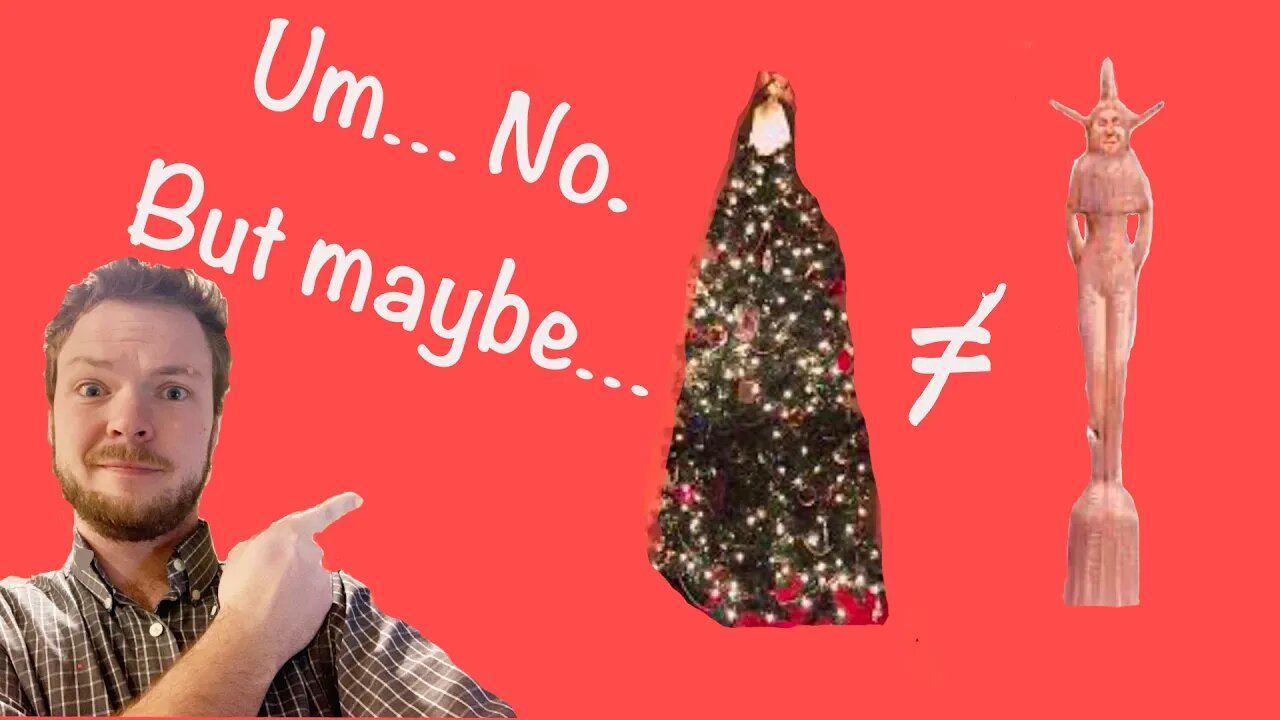Premium Only Content

#079 Is Christmas A Pagan Holiday? Further. Every. Day.
Today, let’s look at the common arguments for a Pagan Origin of Christmas. Let’s put them into 3 categories:
1. The 25th Date coincides with other pagan holidays like Saturnalia and Sol Invictus
2. The gods who were born on the 25th make Christ look like a copycat in a long line of copycats.
3. The Christmas Tree appears to be the Asherah Pole from Jeremiah 10:1-5.
So let’s start with the date of the 25th. Where did the date come from?
Some sources attribute Theophilus of Antioch circa 171-183 AD as the first to use the 25th of December date as the date of Christ’s birth, due to the notion that prophets are conceived on the day they die (Christ’s death being attributed here as the 25th of March). Some even attribute Pope St. Telesphorus in circa 125-136 AD as having ascribed the December 25th date decades earlier. The dates of Saturnalia were the 17th-23rd , never on the 25th. A Pre-Christ Sol Invictus is only referenced in 1 manuscript, the Chronography of 354. This manuscript was written over 100 years after Hippolytus of Rome’s Commentary on Daniel (circa 202~211 AD), which references the December 25th Birth of Christ. It is entirely possible that the observance of Sol Invictus’s birthdate may have even been a mimicry of the December 25th date! There go those two points, showing a crippling lack of scholarship on the part of the proponents of a Pagan Origin of Christmas.
On a side note, I do not believe, like many that Christ’s birth was on the 25th of December. It was likely on the feast of First Fruits in April. This would better fit the prophetic timeline and The Christ Comet is a theory of the Star of Bethlehem that plots the activities of a specific comet to that time frame. This comet would have behaved in such a way as to lead the Magi to Jerusalem and then to Bethlehem, but this is neither here nor there for this discussion.
On the note of the Christmas Tree, the Asherah Pole of Pre-Christ Iran is often connoted with the Tradition of the Christmas Tree, which was started around the 1500s by the French and Germanic Christians, the better part of two millennia separated from Jeremiah’s words in Jeremiah 10:1-5.
On that note, how would uncarved trees have anything to do with carved wooden idols? Just because heathens used trees in false worship, does not mean that trees are somehow pagan. If pagans doing something or celebrating in a certain way makes any association with the item or practice anathema, stop singing, stop praying, and while you’re at it, stop breathing! This extreme is almost a strawman, but the point of this should be why are we doing what we do? Some traditions are valueless, granted. Some are even dangerous, agreed. But let’s base our critiques, if we have them, on facts and not unsupported nonsense. (For example, find an actual ancient source on the use of Christmas Trees for Saturnalia. Few if any exist, and none that we are aware of.)
Santa Clause, on the other hand, is a different story. St. Nicholas (Born circa 280 AD) is the oldest reference of the Jolly Man who gave aid to the poor and powerless. Tales of St. Nicholas include him giving dowries to girls being sold into prostitution, thereby saving them from such a life, and giving gifts to the poor. Others are more fantastic. However, all of these stories should be celebrated, in the context of what the Love of God can do through one man. St. Nicholas wasn’t magical, he was transformed through his relationship to Christ. Santa Claus, as we have him today came from numerous accretions and other legends, some even pagan in origin (think Krampus).
All of that aside, however we got Santa Claus is not necessarily important. What is concerning is that some have taken the caricature of St. Nicholas and turned him into a god who rewards good works and the sacrament of milk and cookies. We tell children Santa and Jesus are both real and then wonder why they no longer believe in Christ only a few short years of their belief in Santa being shattered. Where is our consistency? Have we been guilty of worshiping a false god that satisfies our own paganistic desires for self fulfillment in America? Has Consumerism consumed the message of Christmas?
So, is Christmas a pagan holiday root and branch? Not in the root, but maybe for some, the branch.
https://www.learnreligions.com/why-is-christmas-on-december-25-700439
https://www.patheos.com/blogs/davearmstrong/2017/12/december-25th-birth-jesus-interesting-considerations.html
https://talesoftimesforgotten.com/2019/12/08/just-how-pagan-is-christmas-really/
https://talesoftimesforgotten.com/2018/12/05/the-origins-of-the-christmas-tree/
https://www.thegospelcoalition.org/reviews/great-christ-comet-revealing-star-bethlehem/
#christmastree #christianity #chirstmas #fed #waronchirstmas #notapaganholiday #apologetics #listenable #podcast
-
 1:59:14
1:59:14
FurtherEveryDay
2 months ago#0185 The “Right” Has Lost Its Way, What Is The Right and Left Divide
46 -
 1:36:57
1:36:57
Badlands Media
22 hours agoAltered State S3 Ep. 39
43.8K9 -
 2:04:07
2:04:07
Due Dissidence
11 hours agoCharlie Kirk's GAZA LIES, Caitlin Clark Stalker, Palantir Goes Hollywood - w/ Kyle Matovcik | TMWS
18K4 -
 LIVE
LIVE
I_Came_With_Fire_Podcast
12 hours agoAmerica First, Trump Threatens China, Your Friendly Neighborhood Illegal, EPA Gets a "W"
358 watching -
 LIVE
LIVE
Geeks + Gamers
3 hours agoGeeks+Gamers Play- MARIO KART WORLD
158 watching -
 8:28:19
8:28:19
Dr Disrespect
12 hours ago🔴LIVE - DR DISRESPECT - BATTLEFIELD 1 - FULL GAME
161K7 -
 1:39:26
1:39:26
Glenn Greenwald
7 hours agoStephen Miller's False Denials About Trump's Campus "Hate Speech" Codes; Sohrab Ahmari on the MAGA Splits Over Antitrust, Foreign Wars, and More | SYSTEM UPDATE #495
105K50 -
 1:57:28
1:57:28
Omar Elattar
8 hours agoThe $300M CEO: "The One Skill That Made Me Rich In 15 Different Countries!"
16.8K -
 LIVE
LIVE
xXFadedAngelXx
3 hours ago180 HOURGLASS PULL! Wisdom of Sea and Sky (Pokemon TCG Pocket) Then some RL with Meditayte later
11 watching -
 8:14
8:14
MattMorseTV
8 hours ago $0.72 earnedTrump just DROPPED the HAMMER.
20.2K22